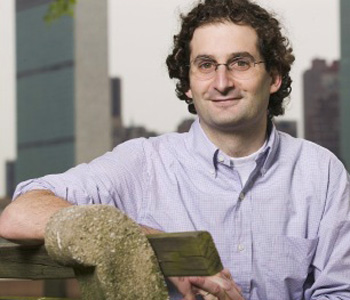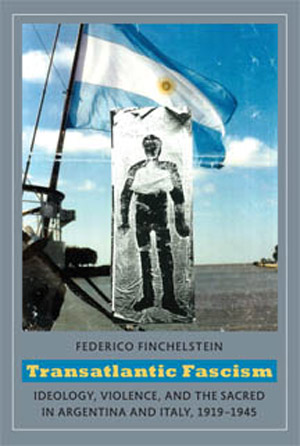
This book provides a contextual and theoretical introduction to transnational fascist ideology and practice, particularly the central role of political violence, empire and war across the “fascist Atlantic.”
I stress the genesis of the conceptual connections between Italian fascism and the Argentine fascists, and also deal with their more general relationship with transnational, self-perceived experiences—communism, totalitarianism, imperialism, the Spanish Civil War, racism and antisemitism, the Holocaust and Nazi Germany.
This is a dimension of the study of fascism that is by and large not emphasized in current historiographical approaches.
While not ignoring nationally specific contexts and traits, the book emphasizes the importance of “fascism for export.” I write specifically about the transatlantic character of fascist discourse and practice as it informs the works of major Argentine and Italian fascist ideologues and intellectuals.
In other words, by focusing on the transatlantic dimensions of fascism, the book deals with the changing ways Mussolini and other leading fascist intellectuals on both sides of the Atlantic conceived their movement as an ideology grounded in global notions of history and politics.
More specifically, the book addresses the Italian fascist attempts to export fascism across the Atlantic. From the perspective of European fascists this was the history of a failure. However, if one thinks this transatlantic ideological encounter as a conversation rather than a passive acceptance of foreign ideology, the idea of failure becomes relative.
This is precisely the way Argentine fascists thought about their transatlantic encounter with European fascism. They were influenced by European fascism and in fact they appropriated many aspects of it. But they created an original, and one might add pervasive, form of “sacred” fascism that gravely affected the Argentine twentieth-century history.
“In certain Catholic countries fascism reoccupied places previously held by institutional religion but also let itself be invested by the ‘sacred.’”
Fascism was a cross-regional civic religion in its most extreme form. In certain Catholic countries fascism reoccupied places previously held by institutional religion but also let itself be invested by the “sacred.”
This intertwining of the secular with the sacred is central to an understanding of Argentine fascism and is thoroughly explored in the book. I stress the complex interaction between secularizing processes and religious tradition and practice. The book focuses on the quasi-religious dimensions of fascism that complexly overlapped with the Catholic “sacred.”
This relation was not devoid of conflicts. But antisemitism, and with it anticommunism, provided both fascists and Catholics on the far right with a common intellectual battlefield on which to join forces as well as a symbolic shared space for enacting fascist ideology.
As a political religion, Argentine fascism was embedded in Catholicism, as the fascists understood it. In this context they resorted to antisemitism as the best metaphor to represent the internal enemy.
Transatlantic Fascism investigates how Mussolini’s propaganda endeavors included the fascist rethinking of Argentine history, fascist transatlantic flights and the extensive use of radio, cinema, cartoons and bribes.
However, if the Italians were selling fascism, the Argentines were not simply buying. Interpretative appropriation was central to this reception. Argentine fascists developed an original appropriation of fascism that they understood as a generic version of their own political movement. They saw European fascism as an example and not as a prefabricated model that simply needed to be assembled.
In chapter 3, for example, I address the question of Argentine fascist self-understanding.
This chapter pays special attention to the different fascist efforts to create a political doctrine. Without the presence of a leader and a regime such as those of fascist Italy, Argentine fascists had a greater autonomy in conceiving an ideological canon and defining their political culture in doctrinal and “sacred” terms.
Argentine fascists understood their fascism as a more complete ideology than their ideological counterparts in Europe. They saw their political movement as a Christian army participating in a “crusade” against their conceived enemies.
“Antisemitism, and with it anticommunism, provided both fascists and Catholics on the far right with a common intellectual battlefield on which to join forces as well as a symbolic shared space for enacting fascist ideology.”
The book deals with the strong political and ideological legacy of Argentine fascism. And it also deals with this fascism’s central role in the birth of Peronism.
Transatlantic Fascism also traces the political and conceptual legacies of Argentine fascism after Peronism, especially the nacionalista idea of the internal enemy, which represents the intellectual genealogy of the last Argentine military dictatorship (1976-1983).
Argentine fascist ideology was at the service of the discourse of the sacred (the “holy” violence of the Cross and the Sword), and occasionally manifested itself in specific acts of violence, torture and repression.
But in the concentration camps of the dictatorship, ideology ceased to be a moment of reality; in them, rather, ideology became reality itself.


Federico Finchelstein is Associate Professor of History at the New School for Social Research and the Eugene Lang College of the New School University in New York City, and also the Director of the Janey Program in Latin American Studies. He received his Ph.D. from Cornell University, and previously taught at Brown University. Finchelstein is the author of four books on fascism, the Holocaust, and Jewish history in Latin America and Europe, as well as more than fifty academic articles and reviews in English, Spanish, French, Portuguese and Italian. Transatlantic Fascism, featured in his Rorotoko interview, was recently published in a Spanish translation in Argentina (Buenos Aires: Fondo de Cultura Económica, 2010).